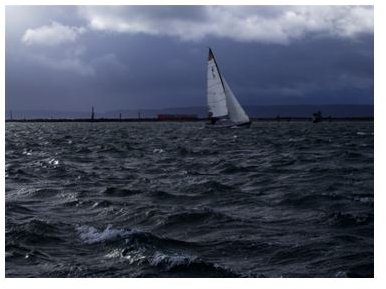The Effects of Drinking Sea Water - Is it Safe?
If you purchase the Mammoth Book of Endurance and Adventure, you will find in it a selection written by Dr. Alain Bombard.
Bombard was a French scientist and physician who deliberately sailed across the Atlantic in a rubber dingy. He did this in order to prove his theory that people who become stranded in the ocean can survive by drinking small amounts of sea water and eating fish. Later on in his journey it rained, and he was then able to use fresh water supplement his liquid intake. He eventually wrote a book on his harrowing experience.
On the other hand, another favorite story of mine, Adrift: Seventy-six Days Lost at Sea, is also a true account of survival, and its author is Steven Callahan. In it, he tells of an ordeal where he was forced to exist in an inflatable raft after his sloop capsized. He refused to drink the sea water, but had only eight pints of water to start with. He was able to add more to his diet by eating fish, collecting rain water, and by using a solar still.
The Bombard vs. Lindemann Controversy
Some medical researchers agree with Bombard. <img src="https://images.brighthub.com/7f/2/7f26155a77dc698c1a799a64aee595d012be61e4_small.jpg" alt="The Sea" title="The Sea">They believe that, in an emergency situation, it is safe to drink salt water provided you have a fresh water source. However, Dr. Hans Lindemann, a German physician, tried to repeat Bombard’s experiment, and was unsuccessful. He became very ill and his legs and feet swelled to dangerous proportions. He wrote a book, Alone at Sea**,** where he called The Good Doctor a fraud.
The German online sea journal Mare, in an edition dedicated entirely to salt, has an article detailing the Bombard vs Lindemann controversy. In analyzing the physiological effects of salt, the author concludes that both were correct, thereby effectively agreeing with Bombard. Thor Heyerdahl also effectively used a sea water/fresh water combination in a 40 to 60% ratio when he sailed across the pacific in a raft. His adventure was made into a book and a documentary.
The Consequences of Drinking Sea Water
Sea water on average is about 96.5% water, and is approximately 3.5% salt. The amount of salt can vary, more or less, in amounts of 3.1 to 3.8% depending on location.
Because of the relatively enormous amount of salt in sea water, individuals who drink it will be subject to dehydration if they partake of it in copious amounts but do not offset it by ingesting fresh water. The high salt content removes moisture from your body through the process of osmosis. This dehydration may cause seizures, unconsciousness, mouth ulcers, swelling of the limbs, brain damage, kidney damage, and ultimately death.
Some of our studies of drinking sea water come from the Nazis. Adolf Hitler despised Gypsies, and tried to exterminate them. At Dachau, his henchman Dr. Hans Eppiner took a group of 90 Gypsies and forced them to drink only saltwater. The Gypsies were so dehydrated that they took to licking freshly mopped floors in a desperate quest to obtain potable water. Many became ill, and some died.
And of course movie lore is fraught with tales of shipwrecked people who succumbed to drinking sea water, and then went insane as a result.
Stance of the U.S. Military
The U.S. military is quite strict on this matter. If you happen to purchase one of their survival manuals from a surplus store or from the Net, you may see the following rules:
- DO NOT drink saltwater.
- DO NOT drink urine.
- DO NOT drink alcohol.
- DO NOT smoke.
- DO NOT EAT unless water is available.
This can be found in a copy of the USMC Marine Combat Water Survival Manual, for example. The Army has a study you can read online.
To Drink or Not to Drink?
Scintific research clearly points out that drinking sea water in large amounts is very unhealthy. Drinking small quantities without ever offsetting it with fresh water is also very clearly unhealthy. As most times it would be impossible, if not extremely hard, to supplement sea water with a proper amount of fresh water in a survival situation, it is best to avoid it altogether.
Finally, some nations concerned with water shortages are trying to find a solution by using reverse osmosis on sea water. This would be unnecessary if having raw sea water as primary drinking source were safe.
References
- A True Account of A Shipwrecked Navy Sailor Who Became Ill From Drinking Sea Water
- HealthyDrinkingWaterBlog.com’s Article on The Danger of Drinking Salt Water
- Lewis, Jon E. The Mammoth Book of Endurance and Adventure. Running Press, 2000
- Image: boatInStorm by pennywise
- Image of Sea Water by by Kevin Rosseel
